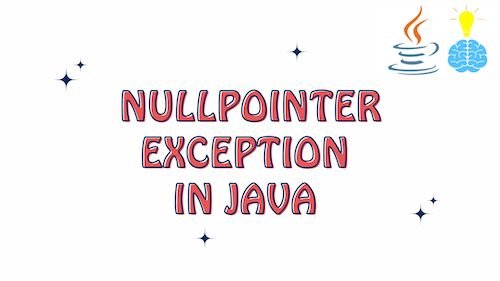In this article, we’ll examine the complexity of NullPointerException in Java, look into how it came to be, and offer suggestions for handling and avoiding it.
Introduction: NullPointerException in Java
In Java programming, a NullPointerException is a common runtime exception. It occurs when a software tries to access or perform operations on an object reference that is currently null, indicating that it does not point to a genuine object instance. If not handled properly, this exception might cause program crashes or unusual behavior. Understanding the causes, consequences, and mitigation methods for NullPointerException is critical for designing robust and dependable Java programs.

Causes of NullPointerException in Java
NullPointerException is a runtime exception that occurs when attempting to perform operations on an object reference that points to null. Here are some common scenarios that lead to this exception, along with illustrative Java code examples:
Uninitialized Object Reference: Accessing methods or fields of an uninitialized object reference.
String name; // Uninitialized object reference
int length = name.length(); // Causes NullPointerException
Invoking Methods on Null:Calling methods on a reference that is currently null.
String text = null; // Null reference
int length = text.length(); // Causes NullPointerException
Null Array References: Attempting to access array elements through a reference that is null.
int[] numbers = null; // Null array reference
int value = numbers[0]; // Causes NullPointerException
Handling and Avoiding NullPointerException in Java
Handling and preventing NullPointerException is crucial to maintain the stability and reliability of Java programs. Here’s how you can effectively manage this exception:
Null Checks and if Statements:Use conditional statements (if) to check if an object reference is null before performing operations on it.
String text = null;
if (text != null) {
int length = text.length(); // Perform operations only if text is not null
}
Proper Initialization: Ensure that object references are properly initialized before using them.
String name = "John"; // Properly initialized object reference
int length = name.length(); // No risk of NullPointerException
Using Optional for Safer Operations:Utilize the Optional class (Java 8 onwards) to handle potential null values and avoid direct null reference operations.
import java.util.Optional;
Optional<String> optionalText = Optional.ofNullable(null);
int length = optionalText.orElse("").length(); // Using Optional to prevent NullPointerException
Defensive Programming:Implement defensive programming techniques by anticipating and handling null values at critical points in your code.
String[] names = getNames(); // A method that might return null
int count = (names != null) ? names.length : 0; // Defensive programming to avoid NullPointerException
Best Practices for Handling NullPointerException in Java
Handling null values effectively is essential for writing robust and reliable Java code. Here are some best practices for null handling:
- Always Initialize References:
- Initialize object references during declaration to avoid uninitialized references leading to NullPointerException.
- Null Checks Before Operations:
- Use null checks (
ifstatements) before performing operations on object references to prevent NullPointerException.
- Use null checks (
- Check Return Values:
- Always check the return values of methods that could potentially return
nullbefore using them.
- Always check the return values of methods that could potentially return
- Avoid Direct Null Reference Operations:
- Avoid chaining method calls directly on object references that could be
null. Use intermediate checks or theOptionalclass.
- Avoid chaining method calls directly on object references that could be
- Leverage the
OptionalClass:- Utilize the
Optionalclass to explicitly handle null values, improving code clarity and error handling.
- Utilize the
- Avoid
nullas a Return Value:- Avoid returning
nullas a meaningful value from methods. Use sentinel values or other strategies instead.
- Avoid returning
- Unit Testing:
- Write comprehensive unit tests to cover scenarios involving null references. This helps identify issues early in development.
Conclusion: NullPointerException in Java
Java developers routinely deal with NullPointerException. This exception, which is brought on by efforts to operate on null object references, may cause unanticipated application crashes and abnormal behavior. Producing robust and trustworthy Java code requires an understanding of the sources of NullPointerException as well as the use of effective handling and avoidance techniques.
We have discussed NullPointerException in Java and its many causes, including uninitialized object references, method invocations on null, and null array references. The danger of running into this exception can be reduced by developers by adhering to best practices such using null checks, the Optional class, and keeping consistent null handling techniques.
Also Read: Common Unchecked Exceptions in Java
